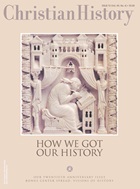"It was the fallacy of Whiggish history!" The student concluded her history paper triumphantly, and the history professor, nodding in agreement, gave her an A. For decades the accusation resounded in colleges and universities of the English-speaking world to refute the dominant way of doing history. Little did most of the accusers know that they were calling on the rhetorical power of Herbert Butterfield (1900-1979).
Butterfield's Whig Interpretation of History made his name as a historian. When he published it, he was a Cambridge fellow, barely 31, slight of build, and very shy. His book, really just a rambling essay, was similarly unimposing. Readers found it difficult to fathom, yet somehow provocative and compelling. The very strangeness of the phrase "Whig interpretation of history" lodged in the memory.
Butterfield defined Whiggish history this way: "What is discussed is the tendency of many historians to write on the side of Protestants and Whigs, to praise revolutions provided they have been successful, to emphasize certain principles of progress in the past and to produce a story which is the ratification if not the glorification of the present."
Though Butterfield had in mind the English Whigs who drew a straight line from the Magna Carta to their own sense of liberty, his observation also fit others: capitalist historians who justify the domination of the industrial West, American historians who chronicle the sure rise of the United States to world power, liberal social historians who trace the triumph of the middle classes, and evangelicals who deem themselves the direct descendents of Paul, Martin Luther, or any other key figure.
In place of the straight-line story, Butterfield modeled historical study as the analysis of complex interactions over time among diverse people and movements. For instance, the achievement of greater freedom of religion in Britain derived not from Protestant doctrines or the progress of the Reformation, but from the interactions of Catholics, the several Protestant groups, and Anglicans. If heroes could be found, they were the Dissenters and Catholics who continued to worship God their own way in the face of domination by the Church of England.
There is the clue to Butterfield's own religion. Butterfield was a Dissenter, a Methodist to be precise, and when he wrote Whig Interpretation, he was still spending several Sundays a year preaching in Methodist chapels around Cambridge. Although he never said so, he had constructed his criticism of "Whiggish history" from the perspective of his religious experience outside the center of the English state and religion.
Inconsistent dualist
Butterfield strove to keep his religious and academic worlds separate. He wrote and lectured astutely on European history, eighteenth century Britain, and the history of political thought. His Origins of Modern Science (1949) helped define the field of the history of science. But he told no one of his weekend preaching. He counted the relationship with God as just about the most intimate thing there was in life, something you do not go on about in public.
All of this changed when, in 1948, the faculty of divinity at Cambridge asked him to deliver a series of lectures on history. He would have to go public in his own university about the intimacies of religion. In an environment where many historians were derisive of any linkage of history and religion, he felt he was ruining himself for life.
But all was not lost. The lectures attracted 1,000 students over two months, and the bbc arranged for him to re-present them on national radio. The book version, Christianity and History (1949), helped stimulate a renewal of Christian views of history in the twentieth century.
Butterfield's statements about religion and history were not straightforward. In the opening lecture, he offered a harsh doctrine of historical study, one that seemed to turn historians into technicians. Historians, he said, properly restrict themselves to tangible evidence, concrete details, and matter-of-factness. From there they look for possible relations among the many facts, and, by the use of imaginative sympathy, seek to reconstruct human personality and reclaim the wholes from which they abstracted the details.
He called this style of historical study variously "technical history" and "scientific history." Its findings, he asserted, "must be equally valid whether I present it to Christian or atheist, Whig or Tory, Swede or Dane." Such history "is independent of philosophy, race or creed," and belongs to a realm quite distinct from religion and even morality. He seemed to posit a stark dualism between religion and history.
The remainder of the lectures then unfolded a view that seemed exactly the opposite of this doctrine. He depicted the unity of religion and history. He claimed the utter centrality to history of a biblical idea of Providence. He affirmed the rationality of the universe as expressed in historical laws, and he believed such laws actually illuminated the ways of God.
He stressed the universality of human sin, for which he used the picturesque word "cupidity." He stood against divorcing the Christ of the theologians from the Jesus of history. He urged the need for a lively sense of charity and the greatest possible elasticity of mind.
Above all, he underscored the absolute validity of human persons both in history and in the outlook of historians as they study history. He acknowledged the role of presuppositions about all these things when historians study history. Again, we see that his religion drives his understanding of history and the way he studies it.
Scientific and Christian
As if to remove his own doubts as well as ours, Butterfield soon published a collection of essays under the title History and Human Relations (1951). His dualism is still there, but then he suggests that the cardinal points of his historical approach are Christian: the features and limits of historical study, the high view of persons, insistence on human freedom and responsibility, imaginative sympathy, the exercise of charity, the perception of rationality in the universe, elasticity of mind.
Scientific history is not neutral after all, but specifically Christian, and Christianity is not an addition, but embodied in his approach to historical study.
Butterfield went further the following year. Speaking before 1,000 youth in Bangor, Wales, he offered his highest statement of the integrity of his religion and his historical study. In the published version, titled God in History (1952), he identified three ways of looking at history. Each way by itself offers a valid understanding of history, but historians who adopt all three ways at once see history more fully.
The first is the "biographical" way, in which we see human beings freely choose and take responsibility for their actions. The second is the "scientific" way, in which we see history as a realm of law necessitating what happens. The third is the "theological" way, in which we see God at work in history through both personalities and processes. The proposal represented his most careful statement of the integration of Christianity and history.
Though Butterfield always framed his ideas in ways the broad historical community could accept, his repeated, and almost naive, proclamations of historical study as a neutral science dissolved under the authenticity of his religious convictions. He summarizes the point in the final sentence of Christianity and History: "We can do worse than remember a principle which both gives us a firm Rock and leaves us the maximum elasticity for our minds: the principle: Hold to Christ, and for the rest be totally uncommitted."
The contours of Butterfield's approach to history—Dissenting, personalist, spiritual, and flexible— represent one option out of the many available, which we may take or leave. But his practice as historian and his eventual self-awareness about the role of his religion in his work induce a deeper understanding of what is going on in historical study. Historians' deepest convictions inexorably steer their work, even when they do not realize it.
C.T. McIntire is professor of the history of religions at the University of Toronto.
Copyright © 2001 by the author or Christianity Today/Christian History magazine.
Click here for reprint information on Christian History.

Support Our Work
Subscribe to CT for less than $4.25/month





























